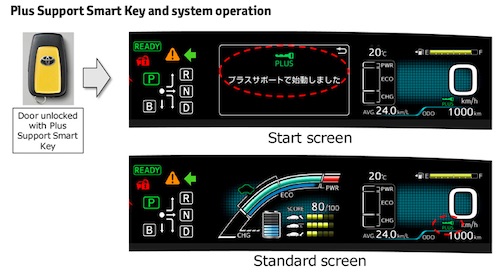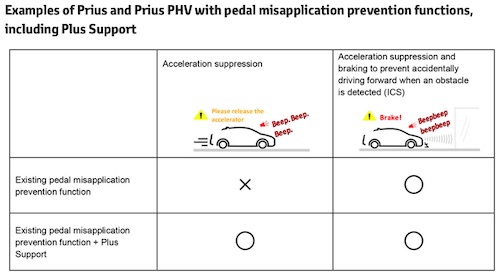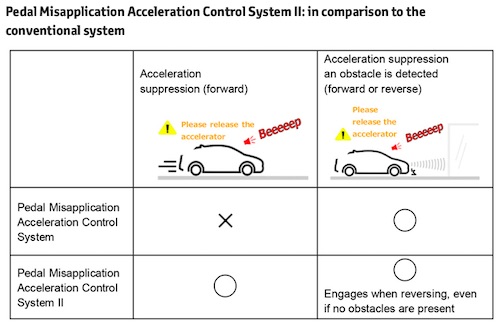Toyota Launches New Acceleration Suppression System
- Written by ACN Newswire - Press Releases
|
|
|
|
|
|
|
|
In 2012, Toyota introduced Intelligent Clearance Sonar (ICS) for new vehicles and since 2018, had launched a retrofit "Pedal Misapplication Acceleration Control System" for existing vehicles.
These existing systems help prevent accidents caused by accelerator pedal misapplication when sensors detect obstacles such as a wall or glass. According to data confirmed by Toyota, ICS helps prevent roughly 70 percent of all potential accidents that could occur due to accelerator pedal misapplication. However, new technologies needed to be developed to reduce the remaining number of accidents, including accidents in situations where obstacles are absent.
At the development phase this time, Toyota first looked at actual accidents where the cause was determined to be accelerator pedal misapplication, particularly analyzing situations where the accelerator pedal was pressed fully. The characteristics of these situations were then compared with big data collected from Toyota's connected vehicles. By eliminating instances where it was determined that drivers were genuinely required to rapidly accelerate intentionally, such as when turning right or accelerating from a temporary stop, Toyota was able to identify and compute instances of accelerator pedal misapplication. In turn, this allowed for a function setting to reduce the number of accidents caused by accelerator pedal misapplication by controlling acceleration even in the absence of obstacles.
Further information regarding Plus Support and Pedal Misapplication Acceleration Control System II that offer the Acceleration Suppression Function is as follows.
Plus Support
Used in
- New vehicles (vehicles with ICS)- The system is being included in Prius and Prius PHV models launched on July 1, and will gradually be rolled out to other models.
Features
- Plus Support starts automatically when the vehicle doors are unlocked using a Plus Support Smart Key (dealer option, starting from 13,200 yen, tax included) for customers with concerns about driving. Even if obstacles are absent from the vehicle's course, this system detects accelerator pedal misapplication and suppresses acceleration.- In addition to ICS, which detects obstacles, suppresses acceleration, and applies brakes, Plus Support aims to further deter serious accidents and help reduce damage caused by misapplication of the accelerator pedal.- When the vehicle's doors are unlocked using a conventional key, Plus Support is not activated, and driving can be performed as usual.
Pedal Misapplication Acceleration Control System II
Used in
- Existing cars (retrofit device)- Installed in Prius models(1). Support will be offered for more models in the future(2) (38,500 yen(3), tax included, not including installation and other expenses).
Features
- This product adds acceleration suppression functionality to the existing "Pedal Misapplication Acceleration Control System," suppressing acceleration when pedal misapplication is detected, even if there are no obstacles in front of the vehicle.- In addition to the functions offered by existing systems that suppress acceleration when an obstacle is detected in front of the vehicle and suppress acceleration when reversing, this system aims to deter serious accidents and reduce damage caused by the misapplication of the accelerator, regardless of whether any obstacles are present when reversing.- Toyota has improved the function while revising the system configuration, resulting in a product that costs 17,600 yen less than the existing product.- This system conforms to the performance certification system developed by the Ministry of Land, Infrastructure, Transport, and Tourism in April 2020 for retrofit pedal misapplication acceleration suppression systems. (The system received the first approval from the ministry.)
By combining its existing ICS and retrofit device functions with the Acceleration Suppression function, Toyota believes it can further reduce the number of serious accidents caused by pedal misapplication in parking lots and other areas. This will enable customers, especially those worried about possible pedal misapplication accidents, to enjoy greater safety and security.
Toyota is not developing and selling these functions for Toyota vehicles alone but has extensively shared the operational logic of the Acceleration Suppression function with other Japanese automakers.
The declining trend in the number of road traffic fatalities in Japan notwithstanding, more than 3,000 precious lives are still lost every year. Led by the belief that "the first step in joyous mass production is safety," Toyota intends to contribute to the elimination of traffic fatalities and injuries--the ultimate goal of a mobility society--using a three-pillar approach: 1) through improvements to car safety; 2) through educational initiatives to help inform people, such as the Support Toyota programs that promote further understanding of safety functions; and 3) through activities that seek to improve road traffic environments. At the same time, Toyota Would like to contribute to the Sustainable Development Goals (SDGs)*4 specified by the United Nations, through the approach to safety.
(1) Vehicles without ICS manufactured between December 2015 and June 2020.(2) Launch planned in November 2020 for Sai (for vehicles manufactured between October 2009 and February 2018)Launch planned in January 2021 for Crown (for vehicles manufactured between February 2008 and December 2012) and Mark X (for vehicles manufactured between October 2009 and November 2016).(3) Other costs and expenses such as installation costs are not included.(4) The International Goals to 2030, adopted by the United Nations General Assembly in September 2015. It is a comprehensive set of 17 goals (social issues) for achieving a sustainable society.
About Toyota Motor Corporation
Toyota Motor Corporation (TMC) is the global mobility company that introduced the Prius hybrid-electric car in 1997 and the first mass-produced fuel cell sedan, Mirai, in 2014. Headquartered in Toyota City, Japan, Toyota has been making cars since 1937. Today, Toyota proudly employs 370,000 employees in communities around the world. Together, they build around 10 million vehicles per year in 29 countries, from mainstream cars and premium vehicles to mini-vehicles and commercial trucks, and sell them in more than 170 countries under the brands Toyota, Lexus, Daihatsu and Hino. For more information, please visit www.toyota-global.com.
Copyright 2020 JCN Newswire. All rights reserved. www.jcnnewswire.com
Authors: ACN Newswire - Press Releases
Read more //?#






